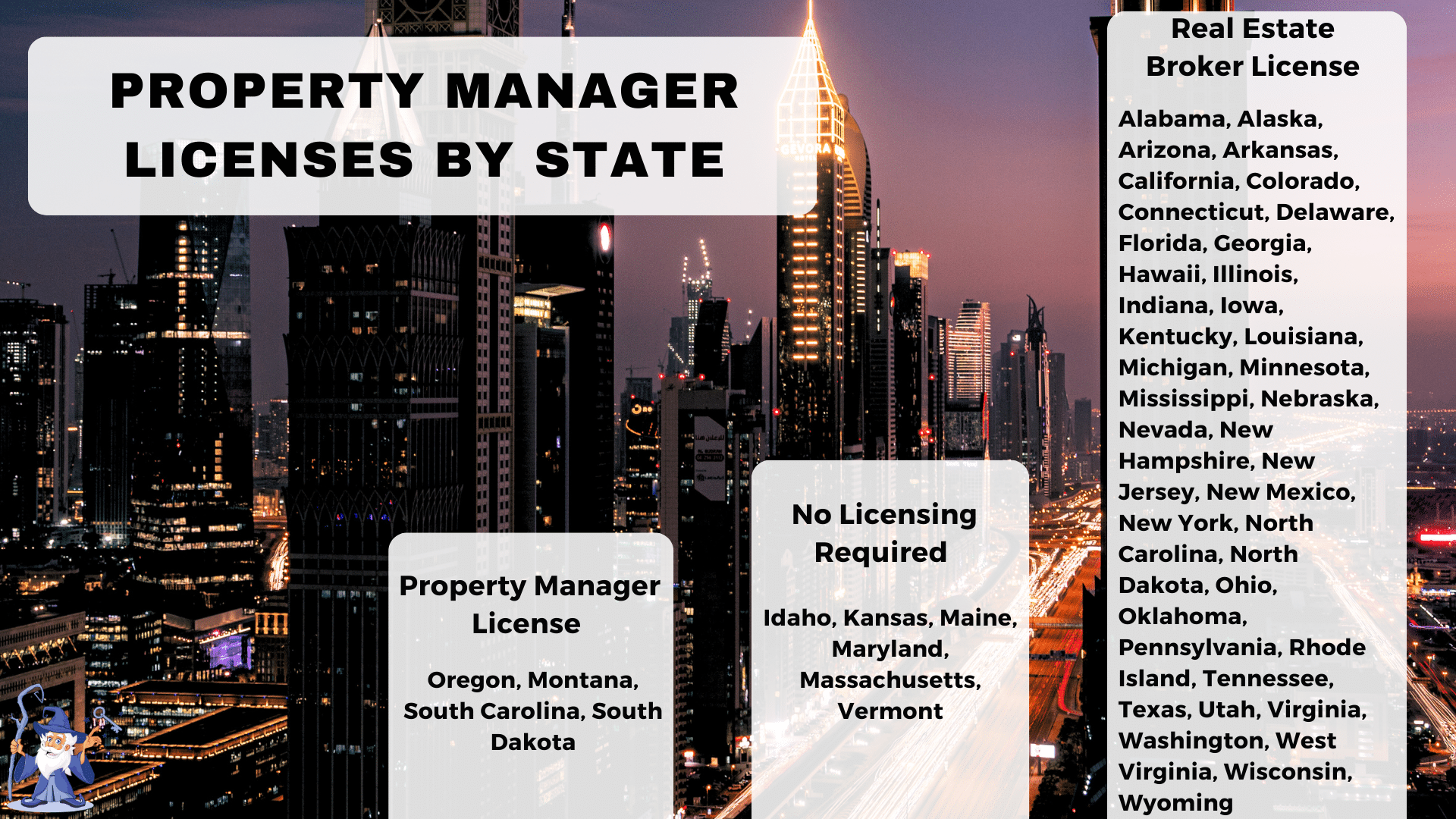With over 3 million licensed real estate agents nationwide, there is no harm in going the extra mile. If you are looking to add diversity to your resume, property management is a good route to consider.
But the question is: do property managers need a real estate license? Property managers in most U.S. states must be licensed. Some states, like South Carolina and Oregon, even require aspiring managers to carry a specific property manager’s license.
Residents of Idaho, Vermont, Kansas, and Maine, among others, however, don’t have to worry about licensing. Their states don’t have licensing requirements for property managers.
This article outlines property management licensing requirements for all 50 states. You’ll leave understanding what’s expected in your region. You’ll gain clarity on getting licensed to launch your property management career compliantly. Now, let’s explore the role of property managers and if they need real estate credentials.
Property Manager Licenses by State

Becoming a property manager can feel like swimming in the deep end, particularly when it comes to understanding the different and constantly evolving licensing requirements. In most states, such as Arizona and California, a real estate broker license is enough to turn any broker into a property manager.
But, aspiring property managers in Montana and South Dakota must hold a property manager license.
On the flip side, though, there are also several places where no specific licensing is necessary. If you’re considering starting operations in Maryland or Massachusetts, for example, you won’t need any special certification.
Role of a Property Manager

A property manager’s life involves various duties that ensure real estate investments function smoothly. It requires a blend of business acumen, people skills, and legal knowledge to help properties and occupants thrive
Leasing Properties
We can liken leasing to the heartbeat of property management. It involves marketing available spaces, vetting potential tenants, setting competitive rent prices, and negotiating lease terms.
For instance, imagine you have a beautiful apartment in downtown Manhattan. But without effective leasing strategies such as online listings or open houses, it will remain vacant. It’s like having a masterpiece painting hidden away in your attic!
Maintenance
Maintenance is another crucial task that a property manager takes on. This includes regular inspections to certify everything is running smoothly.
Property managers are like “the first responders” of the real estate industry. They must respond promptly, take care of any repairs needed, handle emergencies, and ensure properties meet safety standards.
Tenant Relations
Then comes the artful task of managing tenant relations. In every property manager’s toolbox should be the tact to handle communication with tenants.
Tenant communication addresses tenants’ concerns fairly while fostering positive relationships throughout their rental journey.
Think about Mrs. Johnson from Apartment 3B. She loves her home but has issues with noisy neighbors. Maintaining good tenant relations would ensure she feels heard and valued while you work toward resolving the issue.
Managing Finances
Managing finances involves tracking income from rent payments and paying necessary expenses while planning for future costs like renovations or emergency repairs. In short, it’s like running your household.
The slight exception could be drafting budget reports for property owners.
Legal Compliance
Legal compliance refers to abiding by local housing laws. This often includes understanding safety regulations and eviction procedures, how to execute leases, and screen tenants.
Licensed property managers must also conduct background and credit checks. The two are crucial in helping managers sift through tenants.
Landlord-tenant laws also serve as another cornerstone in this compliance architecture. They define what landlords can do regarding rent increases or evictions.
Equipped with an intimate familiarity with these rules, a licensed property manager ensures operations run smoothly without infringing upon either party’s rights.
Benefits of Licensure

Licensure comes with various benefits that can significantly enhance your career. That small piece of paper has the power to set you apart from the competition. It showcases your commitment to maintaining high professional standards while providing top-notch service.
It’s worth noting that even in states where licensure for property management isn’t required, aspiring managers still have options. They could apply for a standard real estate license like a broker license, which still carries significant clout in the industry.
The license provides legal authorization to sell properties and demonstrates comprehensive knowledge about various aspects of the real estate market.
Increased Credibility and Professional Opportunities
In an industry where trust and expertise are paramount, a license signifies to clients and employers that you have met certain standards of knowledge, ethics, and experience in property management.
Having a license doesn’t only mean you’ve passed some tests. It’s tangible proof that you possess the necessary skills and knowledge to manage properties effectively. It shows that you have been vetted by authoritative bodies, demonstrating your commitment to maintaining high industry standards.
However, the benefits of being licensed extend beyond personal growth. They also play an integral role in attracting more clients. In today’s competitive market, clients are not looking for someone who can get the job done. They’re searching for professionals who stand out from their peers through proven expertise and dedication.
Possessing a license also aids in building trust with potential clients. Clients often feel more comfortable entrusting their properties to managers who hold licenses. It gives them peace of mind, knowing these individuals adhere to established regulations and ethical guidelines.
Ability to Work Independently and Have Full Authority
Property management offers a unique opportunity for those who crave independence and authority in their professional life. For instance, licensed property managers can venture out on their own.
In contrast to other real estate professions, a licensed property manager can operate without needing the oversight of another higher-licensed professional, such as a broker. This autonomy allows them to carve out their path, make decisions independently, and manage properties based on their judgment.
They can establish businesses and run them according to their personal strategies and principles. They will hold full operational authority over the company, a prospect that is both exciting and challenging.
Better Legal Protection and Compliance

Armed with a deep understanding of legal provisions, property managers ensure every tenant receives equal treatment under the law. A licensed property manager finds themselves at the heart of upholding the legal framework, their license serving as proof they have been trained to protect these laws.
One key area where this knowledge comes into play is fair housing. Fair housing laws prevent discrimination in housing based on race, religion, sex, or disability, among others. These laws apply not only to selling homes but also to leasing apartments.
Protecting tenants’ rights is another aspect that falls within the jurisdiction of a licensed property manager. Tenants have certain protections under the law aimed at fostering mutual respect between them and landlords.
Furnished with this knowledge, a licensed property manager can help maintain harmonious landlord-tenant relationships while avoiding potential legal pitfalls.
Working as an Unlicensed Property Manager
A day in the life of a property manager means wearing multiple hats: financier, caretaker, problem-solver. All these are rolled into one dynamic package where every day presents new challenges waiting to be conquered.
But the majority of the fun is reserved for licensed managers.
Working as an unlicensed property manager poses several disadvantages that can limit professional growth and potential.
Limited Scope of Tasks

One of the most significant drawbacks is the limited scope of permissible tasks. Without a license, you are restricted in your duties, which may result in missed opportunities and hindered career advancement.
In most states, legal activities are reserved for licensed property managers. One example comes from California. The California Legislation reserves the right to participate in sale-purchase transactions to licensed individuals.
This inability is a significant disadvantage for unlicensed property managers. The limitation means they cannot facilitate or negotiate deals on behalf of their clients. It also hinders them from providing comprehensive services and leaves them at a competitive disadvantage compared to their licensed peers.
Another limitation faced by unlicensed property managers centers around contracts. Without proper licensing, these professionals are not legally allowed to draft or write contracts. It shoves them into a dependency corner, where they must rely on licensed professionals to help them conduct essential aspects of real estate management.
Dependence on Licensed Brokers
One of the greatest joys of being a property manager is the ability to run your ship as you wish. But it is a pleasure unlicensed managers must forfeit.
Unlicensed managers must operate under the constant supervision of brokers. These managers are often forced into a passive role, handling administrative work or assisting brokers instead of actively engaging with tenants and prospective buyers.
Getting Licensed as a Property Manager

Earning your stripes as a property manager starts here. With every type of real estate license, there is a licensing journey to fulfill.
Receiving your license means embarking on an educational excursion where you’ll learn everything from real estate law to effective property marketing strategies.
You will need to remember that every state has its own rules and regulations for obtaining a property management license. But what I have drafted for you are the general guidelines across different states that require property management licensing.
Eligibility Requirements
If you dream of owning a property management license, you must be at least 18 years old. This requirement is constant for every real estate license.
Another requirement hopeful managers must meet is education. Licensing agencies like the Oregon Real Estate Commission require licensees to possess a high school diploma or equivalent to be eligible for a property management license.
Completing Pre-licensing Education

Once you know you qualify to become a property manager, the next move is completing the pre-licensing education. Pre-licensing courses are not only mandatory hurdles to cross off while getting licensed. Instead, they are opportunities to deepen your understanding and sharpen skills within the property management field.
Take South Dakota as an example. The South Dakota Department of Labor and Regulation mandates a 40-hour course covering the fundamentals of property management.
The pre-licensing hours you must complete will also depend on your state. If you’re pursuing a professional license in Montana, you’ll need to complete a 30-hour course as part of your pre-licensing education.
But if you are based in Oregon, buckle up for a more extensive learning journey because there’s double the commitment involved! A whopping 60-hour course stands between aspiring professionals and their licenses here.
Passing the Property Management Exam
When taking the initial step toward your property management career, getting the property management exam registration right is vital. This is not a task you put off until later. It requires immediate action and planning.
The first thing that applicants need to do is register for their exam. If you are based in Oregon, you will also have to schedule your test day.
First-time licensees looking to ace their real estate license exam, we have a practice exam you can use to prepare.
You will also need to pay an application fee before your application can be processed.
Applicants will have to visit their licensing agency’s website to review the exact fee they have to pay. South Carolina residents will have to shell out $25 for their application fee.
Applying for Licensing

Once you’ve successfully navigated the hurdle of passing your exam, the next step is applying for licensing. The process begins with submitting an application to the relevant authorities. It’s a phase that officially marks your transition from being a student or trainee to becoming a recognized professional in your field.
This stage involves more than paperwork. To ensure public safety and maintain high professional standards, applicants must submit to a fingerprint-based criminal background check. This comprehensive screening process helps identify past transgressions that disqualify someone from obtaining their license.
It’s important to note that this procedure will have associated costs.
Becoming a Property Manager
Do property managers need a real estate license? In most parts of the country, they do. Most U.S. licensing bodies accept a broker license, while others don’t require any licensing. But, in four states, property managers must carry a specific property management license.
Ready to dive into this exciting career? Here are the next steps.
Next Steps
- Research your state’s specific licensing requirements.
- Enroll in required courses or training programs to equip you with the necessary knowledge about real estate law and effective property marketing strategies.
- Prepare yourself for the examination through strategic practice sessions.
If math is your nemesis, our real estate math practice test could be your ally. We put in the time. We formulated the questions. We updated the test and took several coffee breaks. We verified the answers, so you wouldn’t have to.












